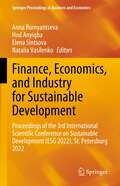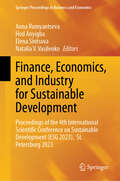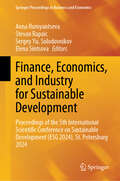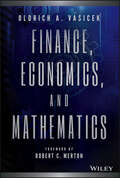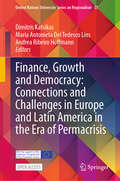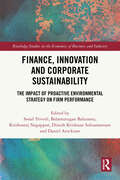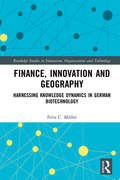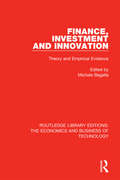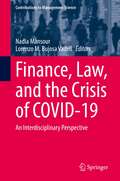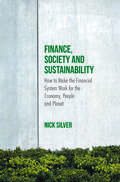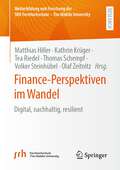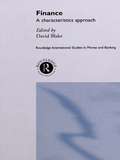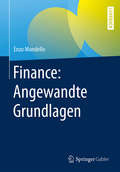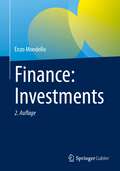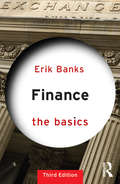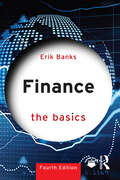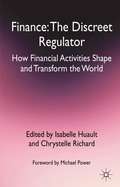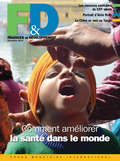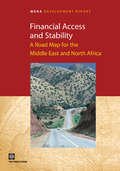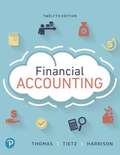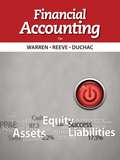- Table View
- List View
Finance, Economics, and Industry for Sustainable Development: Proceedings of the 3rd International Scientific Conference on Sustainable Development (ESG 2022), St. Petersburg 2022 (Springer Proceedings in Business and Economics)
by Anna Rumyantseva Hod Anyigba Elena Sintsova Natalia VasilenkoThis volume presents the proceedings of the 3rd International Scientific Conference on Sustainable Development (ESG 2022), St. Petersburg 2022. It discusses strategic approaches and relevant decisions of business, government, and civil society to achieve the Sustainable Development Goals (SDG), which were adopted by all UN member states in 2015. At present, the economies of different countries are in a zone of turbulence and the current agenda pushes the transformation of all customary systems to maintain and keep the achieved positions. The need to implement the agenda of sustainable development and achieve the SDGs is implemented through the socio-economic development strategies of countries with low greenhouse gas emissions, opportunities for green and transitional projects are considered, the issue of disclosure of non-financial reporting is widely studied, which can provide additional signal to business about the framework of sustainability in a changing world, as well as prospects for implementation of social and managerial business initiatives within the SDGs.The economies of various countries are currently in a zone of turbulence, and the current agenda is pushing for the transformation of all customary systems to maintain and sustain the positions achieved. The need to implement the sustainable development agenda and achieve the SDGs is being realized through the socio-economic development strategies of countries with low greenhouse gas emissions, opportunities for green and transitional projects are being considered, non-financial reporting disclosure is being widely studied, which can provide an additional signal to business about the sustainability framework in a changing world, and prospects for social and managerial business initiatives under the SDGs.This volume brings together material on sustainable development in economics and finance as well as industry. It is intended for scholars and professionals involved in public and corporate finance, financial accounting and auditing, sustainable development risk management, as well as economic growth, macroeconomics, monetary policy in a sustainable development environment, public and corporate governance and economics, corporate communications and public relations.
Finance, Economics, and Industry for Sustainable Development: Proceedings of the 4th International Scientific Conference on Sustainable Development (ESG 2023), St. Petersburg 2023 (Springer Proceedings in Business and Economics)
by Anna Rumyantseva Hod Anyigba Elena Sintsova Natalia V. VasilenkoThis volume discusses strategic approaches and relevant decisions of business, government, and civil society to achieve the Sustainable Development Goals (SDG), which were adopted by all UN member states in 2015. The book presents the proceedings of the 4th International Scientific Conference on Sustainable Development (ESG 2023), St. Petersburg 2023. At present, the economies of different countries are in a zone of turbulence and the current agenda pushes the transformation of all customary systems to maintain and keep the achieved positions. This volume brings together material on sustainable development in economics and finance as well as industry. It is intended for scholars and professionals involved in public and corporate finance, financial accounting and auditing, sustainable development risk management, as well as economic growth, macroeconomics, monetary policy in a sustainable development environment, public and corporate governance and economics, corporate communications and public relations.
Finance, Economics, and Industry for Sustainable Development: Proceedings of the 5th International Scientific Conference on Sustainable Development (ESG 2024), St. Petersburg 2024 (Springer Proceedings in Business and Economics)
by Anna Rumyantseva Elena Sintsova Stevan Rapaic Sergey Yu. SolodovnikovThis book explores business and governance solutions for achieving the Sustainable Development Goals (SDGs), adopted by all UN member states in 2015. It features the proceedings of the 5th International Scientific Conference on Sustainable Development (ESG 2024), held in St. Petersburg in 2024. Without adequate funding to invest in sustainable development and the transformation of energy and food systems, countries and companies cannot achieve stable financial positions. To meet the SDGs, all nations and businesses must invest in renewable energy, universal social protection, quality education, decent jobs, universal health coverage, sustainable food systems, infrastructure, and digital transformation. Incentives for SDG achievement address financing needs through a combination of various forms and mechanisms. Implementing these incentives will also necessitate broader changes in both national and international financial architectures. The book covers a range of fields, including sustainable development for the national and global economy, sustainable development in industrial and financial policy, financing sustainable transformations in industry, finance, and management, sustainable development principles in tax systems, and impact of sustainable development on financial markets among other topics. The book is intended for scholars and professionals involved in public and corporate finance, financial accounting and auditing, sustainable development risk management, economic growth, macroeconomics, monetary policy within a sustainable development environment, public and corporate governance, as well as corporate communications and public relations.
Finance, Economics, and Mathematics
by Robert C. Merton Oldrich A. VasicekThe compiled works of the man behind the evolution of quantitative finance Finance, Economics, and Mathematics is the complete Vasicek reference work, including published and unpublished work and interviews with the man himself. The name Oldrich A. Vasicek is synonymous with cutting-edge research in the finance fields, and this book comes straight from the source to bring you the undiluted mother lode of quant wisdom from one of the founders of the field. From his early work in yield curve dynamics, to the mean-reverting short-rate model, to his thoughts on derivatives pricing, to his work on credit risk, to his most recent research on the economics of interest rates, this book represents the life's work of an industry leader. Going beyond the papers, you'll also find the more personal side inspirational as Vasicek talks about the academics and professionals who made lasting impressions and collaborated, debated, and ultimately helped spawn some of his greatest thinking. Oldrich Vasicek has won virtually every important award and prize for his groundbreaking research in quantitative finance. You've followed his work for years; this book puts it all in a single volume to give you the definitive reference you'll turn to again and again. Explore Vasicek's insights on topics he helped create Discover his research and ideas that have gone unpublished--until now Understand yield curves and the Vasicek model from the source himself Gain a reference collection of some of the most influential work in quantitative finance Vasicek's research is the foundation of one of the most important innovations in finance. Quants around the world have been influenced by his ideas, and his status as thought leader is cemented in the annals of finance history. Finance, Economics, and Mathematics is the definitive Vasicek reference every finance professional needs.
Finance, Growth and Democracy: Democracy, Finance, and Growth (United Nations University Series on Regionalism #33)
by Dimitris Katsikas Andrea Ribeiro Hoffmann Maria Antonieta Del Tedesco LinsThe present volume uses a comparative regional approach to analyze how permacrisis—an extended period of instability and insecurity—has been experienced and dealt with in the European Union (EU) and Latin America. Written by academicians and policy experts from both regions, the volume has three main objectives. Firstly, it critically evaluates the response of regional organizations and governments in the EU and Latin America to the crises that have shaken these regions in recent years. Secondly, chapters contribute to a better understanding of the promised benefits and risks of digital currencies and fintech more generally to economic growth, financial stability and inclusion. Finally, the volume promotes an understanding of the challenges of permacrisis in both the EU and Latin America, as well as encouraging their cooperation at the multilateral and bi-regional levels. Providing an interdisciplinary perspective, this volume will be of interest to researchers and students of international relations, international political economy, international finance and economics, international law, global governance, and regionalism, as well as public officials of ministries of foreign affairs, finance and the economy, public officials of international and regional organizations. This is an open access book.
Finance, Innovation and Corporate Sustainability: The Impact of Proactive Environmental Strategy on Firm Performance (Routledge Studies in the Economics of Business and Industry)
by Balamurugan Balusamy Daniel Arockiam Sonal Trivedi Krishnaraj Nagappan Dinesh Krishnan SubramaniamThis book explores how the problem of global sustainability could turn into a major force for innovation leading to enhanced firm performance. It addresses whether proactive environmental strategy and innovation are integrated with a firm’s performance. The goal of this book is to advance the rapidly developing field of sustainable business beyond the straightforward logic of cost, waste and risk reduction.The authors offer significant insight into how internal—life cycle design—and external—image and reputation—innovation strategies serve to mediate and possibly reinforce one another by investigating the relationship between proactive environmental strategy and innovation in relation to firm performance. The book includes empirical research, case studies and real-world examples as well as lessons learned from the successful and unsuccessful transformation initiatives of numerous international companies.This book is primarily aimed at an academic audience of scholars, researchers and advanced students in the fields of finance, economics, sustainability, innovation and environmental studies and will also appeal to practitioners and industry experts in these areas.
Finance, Innovation and Geography: Harnessing Knowledge Dynamics in German Biotechnology (Routledge Studies in Innovation, Organizations and Technology)
by Felix C. MüllerThe overarching aim of Finance, Innovation and Geography: Harnessing Knowledge Dynamics in German Biotechnology is to explore linkages between geographies of finance and relational geographies of innovation. This is achieved by questioning how investment activities affect the unfolding of innovations and in turn are affected by it. This book focuses on biotechnology innovation processes from the perspective of relational economic geography. It reconstructs the unfolding in time and space of eight innovations in German biotechnology. Each one is represented in a qualitative case study. The analysis focuses on the relational work of building, transforming, ending and replacing of collaborative relationships and organizational arrangements surrounding emergent innovations ・ including investment relations and relational work by investors. In this way, the contribution of investors to unfolding innovations is studied with sensitivity to context and situated interactions. The geography of these dynamics is conceptualized by drawing on the recent literature on relational proximity and distance as well as ideas of materiality and space. This book provides a unique perspective, and shows that innovation paths are strongly interwoven with local and temporary opportunities as well as crises, and that investment is embedded in these dynamics. This is essential reading for students and academics of both economics and innovation.
Finance, Investment and Innovation: Theory and Empirical Evidence (Routledge Library Editions: The Economics and Business of Technology #4)
by Michele BagellaThis book provides a critical evaluation of the literature on finance, investment and innovation and proposes new research methods for evaluating the comparative performance of financial systems in supporting innovation. The comparative advantage of this book is that of being directly focused on one of the main unsolved issues in monetary and financial economics: the relative effectiveness of national financial systems in supporting innovation. It proposes various theoretical and empirical contributions that, taken together, allow to evaluate the relative effectiveness of some of the most important country systems such as Japan, and the UK and Italy.
Finance, Law, and the Crisis of COVID-19: An Interdisciplinary Perspective (Contributions to Management Science)
by Nadia Mansour Lorenzo M. Bujosa VadellThis book analyzes the impact of Covid-19 in different areas such as corporate social responsibility and legislation in SMEs, insolvency law, behavioral finance, government interventions in markets, financial disclosure, the emergence of unregulated financial sectors, the increase of coronavirus-related crimes, and the development of banking regulations in the Covid-19 pandemic, among others.The coronavirus epidemic, which has spread throughout the world, has highlighted the inadequacies of the health and social systems of all states, even the most advanced. The health emergency has required extraordinary measures, especially at the level of laws that are essential for the preservation of lives, health, and livelihoods. The priority for governments and even the international community was, from the outset, to prevent infections and care for those affected. Such a strategy required an unusual increase in health spending, even though it exceeded the State's financial capacity and lacked fiscal space. In addition to this challenge, which has not yet been overcome, there is another, that of redressing the consequences of the measures taken (general containment). It should be pointed out that during health crises, the state may have to review the requirement for transparency because of the emergency, but not free itself from it. The urgency could never be an alibi for a violation of citizens' rights and freedoms.With urgency, financial management systems must be flexible and responsive to all occurrences, while ensuring optimal use of resources and minimizing the risks of fraud and corruption.
Finance, Politics, and Imperialism
by Andrew DilleyAndrew Dilley offers a major new study of financial dependence, examining the connections this dependence forged between the City and political life in Edwardian Australia and Canada, mediated by ideas of political economy. In doing so he reconstructs the occasionally imperialistic politic of finance which pervaded the British World at this time.
Finance, Society and Sustainability: How to Make the Financial System Work for the Economy, People and Planet
by Nick SilverThis book is a critical analysis of the impact of the financial system on the economy, society and the natural environment. It cuts through the noise to looks at its purpose, its activities, and what it does in practice.Unlike other books that cover the last financial crisis and the risk of another one; this book is about the consequence of the financial system continuing in its current form. It argues that the financial system is a construct of flawed economic theories, designed in the hope that the market will efficiently allocate society’s capital. Instead, the finance sector allocates savings and investment to maximize its own revenues, with resulting collateral damage to the economy, society and the environment.Although governments try to preserve and regulate the existing system, it is being replaced by a new system driven by technological innovation. The book describes the opportunities this presents for a renaissance of the financial system to actually meet the needs of society, and to re-engineer our economy to avoid environmental crisis.The book is for anyone who would like to understand the finance system’s purpose, what it does in practice and its impact on the real world. For those working in the industry it provides an overview of the system, their place within it, and how to bring about change. For students and academics it provides a valuable critique of the financial system, and the theories on which it is based. For financial policymakers and regulators it identifies key challenges in their activities.
Finance-Perspektiven im Wandel: Digital, nachhaltig, resilient (Weiterbildung und Forschung der SRH Fernhochschule – The Mobile University)
by Volker Steinhübel Matthias Hiller Kathrin Krüger Tea Riedel Thomas Schempf Olaf ZeitnitzDer Sammelband stellt aktuelle Entwicklungen in Wissenschaft und Praxis – immer aus dem Blickwinkel des Finanz- und Rechnungswesens und des Controllings - umfassend und gleichzeitig fokussiert dar. Dabei werden Aspekte insbesondere zur Realisierung einer digitalen, nachhaltigen und resilienten Unternehmung aufgezeigt. In den Beiträgen werden verschiedene Themen aufgegriffen, u. a. Entwicklungen und Perspektiven im Steuerrecht sowie der Wandel des Finance-Bereichs durch Nachhaltigkeit, Innovationen und Technologien.
Finance: A Characteristics Approach (Routledge International Studies in Money and Banking #Vol. 7)
by David BlakeSince the 1980s, the characteristics model in economics has been applied to the field of finance, and offers a fresh perspective for understanding financial behaviour. This book brings together some of the latest research by leading exponents of the characteristics model and its application to finance.
Finance: Angewandte Grundlagen
by Enzo MondelloDieses Buch gibt Studierenden von Fachhochschulen und Universitäten sowie Teilnehmern von Weiterbildungslehrgängen einen umfassenden und gut verständlichen Einstieg in die finanzmarkttheoretischen Konzepte der Kapitalanlage. Dazu gehören die Grundlagen des Portfoliomanagements, die wichtigsten Anlageinstrumente sowie die Verfahren zu ihrer Analyse und Bewertung. Jedes Kapitel besteht aus einer Einleitung, dem eigentlichen Lehrinhalt, einer Zusammenfassung, Aufgaben und Lösungen, Microsoft-Excel-Applikationen und dem Literaturverzeichnis. Das Buch ist praxisorientiert, da zum einen die im Buch aufgeführten Aufgaben vorwiegend reale Beispiele enthalten und zum anderen am Ende der Kapitel die Microsoft-Excel-Applikationen aufgeführt sind, welche die Umsetzung der im Kapitel vorgestellten Finance-Konzepte ermöglichen.
Finance: Investments
by Enzo MondelloDieses Buch gibt Studierenden von Fachhochschulen und Universitäten sowie Teilnehmern von Weiterbildungslehrgängen einen umfassenden und gut verständlichen Einstieg in die finanzmarkttheoretischen Konzepte der Kapitalanlage. Dazu gehören die Grundlagen des Portfoliomanagements, die wichtigsten Anlageinstrumente sowie die Verfahren zu ihrer Analyse und Bewertung. Jedes Kapitel besteht aus einer Einleitung, dem eigentlichen Lehrinhalt, einer Zusammenfassung, Aufgaben und Lösungen, Microsoft-Excel-Applikationen und dem Literaturverzeichnis. Das Buch ist praxisorientiert, da zum einen die im Buch aufgeführten Aufgaben vorwiegend reale Beispiele enthalten und zum anderen am Ende der Kapitel die Microsoft-Excel-Applikationen aufgeführt sind, welche die Umsetzung der im Kapitel vorgestellten Finance-Konzepte ermöglichen.
Finance: The Basics (The Basics)
by Erik BanksNow in its third edition, Finance: The Basics is a clear and practical introduction to the world of finance. It thoroughly explains essential financial statements, tools and concepts; fundamental financial instruments and transactions; and global financial participants, markets and systems. This fully revised third edition captures the most important aspects of a changing financial landscape, including: • Updates on key areas of the financial system, including default experience, corporate finance trends, growth in dark pools, hedge funds, foreign exchange and derivatives, and changes to the international regulatory and central banking framework. • Further real-world examples/studies that introduce, or expand upon, a range of practical topics; 12 updated studies are supplemented by new cases related to reinsurance, central bank quantitative easing and digital currency and payments. • A comprehensive glossary containing key terms discussed in the book. Each chapter is accompanied by an overview and summary, illustrations and tables, real life case studies, and recommended readings. Finance: The Basics is essential reading for anyone interested in the fascinating world of finance.
Finance: The Basics (The Basics)
by Erik BanksNow in its fourth edition, Finance: The Basics is a clear and practical introduction to the world of finance. It thoroughly explains essential financial statements, tools, and concepts; fundamental financial instruments and transactions; and global financial participants, markets, and systems. This fully revised edition captures the most important aspects of a changing financial landscape, including: • A new chapter dedicated to the emerging world of digital currencies, with a review of digital finance and a detailed discussion of regulated and unregulated digital currencies (including cryptocurrencies). • New sections dealing with a range of social issues that directly impact on finance, including sustainability; environmental, social, and governance (ESG) and socially responsible investing (SRI) imperatives; microfinance; and impact investing. • Twelve updated real-world case studies ('Finance in Action' studies) and nine new case studies focused on annuities, sustainability, green financings, microfinance, digital currencies, financial technology/decentralised finance, ESG and SRI investing, quantitative easing and tightening, and the financial emergence of China. • A concise and comprehensive glossary containing key terms discussed in the book. • Supplemental digital resources, including PowerPoints for instructors and a test bank of questions for students. Each chapter is accompanied by an overview and summary, illustrations and tables, real-life case studies, and recommended readings. Finance: The Basics is essential reading for anyone interested in the fascinating world of finance.
Finance: The Discreet Regulator
by Isabelle Huault Chrystelle RichardThe global financial crisis that began in the summer of 2007 has brought the financial industry to centre stage. While most current analysis focuses on the way finance can be regulated in the topical context of the economic crisis, this book aims to show how financial activities actually shape and transform the world. Highlighting that the true regulators of the economy are not only regulatory state authorities, the book demonstrates that the financial sphere really does contribute to rule-setting. It argues that actors that seem to be the objects of regulation or intervene only at its fringe are in fact 'discreet regulators' which provide the institutional framework that fosters the creation and globalization of markets. Building on a series of case studies, Finance: The Discreet Regulator highlights how public authorities and private actors jointly regulate the real world, with joint regulation being dominated by a multiplicity of financial actors, and looks at a variety of key players, who take part in the very heart of the regulatory process.
Finances & Développement
by Fonds monétaire internationalA report from the International Monetary Fund.
Finances & Développement
by International Monetary FundA report from the International Monetary Fund.
Financial Access and Stability
by The World BankThe countries of the Middle East and North Africa (MENA) have been recovering from the global financial crisis, but the recent political turmoil has interrupted the pace of credit and output recovery in many countries. The political turmoil in the MENA region reveals deep-seated frustrations and a sense of political, social, and economic exclusion, especially among the youth. The relatively weak growth performance reflects a combination of insufficient reforms and weak reform implementation, including financial sector reforms. The structural weaknesses of financial sectors imply that access to finance may remain restricted even with a full recovery of credit activity. Therefore, the region's countries face an ambitious reform agenda to revert two decades of relatively poor performance of output and employment growth. Financial development should be a central component of the region's growth agenda. This study reviews the region's financial systems, the severity of the limitations on access to finance, and the main factors behind such limitations. It goes on to provide a road map for expanding access and preserving financial stability.
Financial Accounting
by Joe Ben Hoyle C. J. SkenderThis book is suitable for an undergraduate or MBA level Financial Accounting course. If authorship matters (and we believe it is everything) then this book is destined to be a classic. There are no two better authors than these. Joe Ben Hoyle is co-author of two current market-leading advanced accounting textbooks with McGraw-Hill. He and and co-author CJ Skender are nationally recognized as master teachers. Both have won numerous teaching awards, and both were recently recognized by BusinessWeek as top undergraduate professors. The authors bring their collective teaching wisdom to bear in this book not by changing "the message"(financial accounting content), but by changing "the messenger" (the way the content is presented). The approach centers around utilizing the Socratic method, or simply put, asking and answering questions. The reason that this approach continues to be glorified after thousands of years is simple - it engages students and stresses understanding over memorization. So this text covers standard topics in a standard sequence, but does so through asking a carefully constructed series of questions along with their individual answers.
Financial Accounting
by Charles Horngren Walter Harrison C. Thomas Wendy TietzAccounting is the language of business, and understanding the role accounting plays in business is critical to a student's success in earning a business degree. Financial Accounting puts the focus on the purpose of Accounting in business. With student-friendly examples and streamlined chapters, the 12th Edition delivers a student-centric approach to learning financial accounting. Time-tested resources like the Turnkey Case Resources, help students grasp the practical concepts of accounting, so that they can put them into practice in their future business careers.
Financial Accounting
by Carl S. Warren James M. Reeves Jonathan DuchacActivate Learning with Warren/Reeve/Duchac's, FINANCIAL ACCOUNTING! Market-leading FINANCIAL ACCOUNTING has been on the forefront of innovation and change based on the needs of today's students. Warren offers you clear guidance to complete homework with an efficient presentation for today's learner. The high impact writing style and streamlined design makes important information accessible, with a focus on providing the best and most complete examples. The Complete Learning System in FINANCIAL ACCOUNTING and CengageNOW is built around the way you use textbooks and online resources to learn, study and complete homework, allowing you to achieve ultimate success in this course. The end goal of Warren/Reeve/Duchac's text and technology learning system is to Activate Learning & making you a more active participant in the learning process and making you better prepared--ready to take on the rest of your educational and career goals.
Financial Accounting
by Wayne Thomas Don Herrmann David SpicelandDon’t you love those moments in your course when students are fully engaged? When the “Aha!” revelations are bursting like fireworks? David Spiceland, Wayne Thomas, and Don Herrmann have developed a unique set of materials based directly on their collective years in the classroom. They’ve brought together best practices like highlighting Common Mistakes, offering frequent Let’s Review exercises, integrating the course with a running Continuing Problem, demonstrating the relevance of the course with real-world companies and decision analysis, and conveying it all in a student-friendly conversational writing style. The authors have developed a concise and well-organized learning framework to show students that accounting consists of three major processes: measuring, analyzing, and communicating. By consistently tying each lesson into this framework, instructors can continue to improve student outcomes. After the proven success of the first four editions of Financial Accounting, the fifth edition will continue to motivate, engage, and challenge students. Paired with the market-leading power of the Connect platform, the Spiceland/Thomas/Hermann author team will truly illuminate the financial accounting course for each student.
